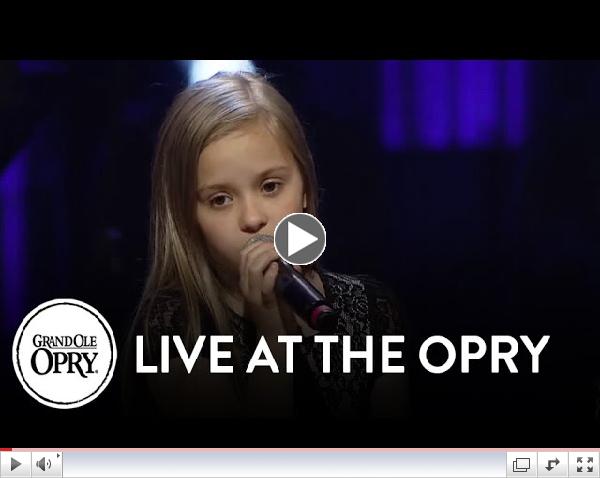 | |
Lennon and Maisy
'Hard Times Come Again No More' at the Grand Ole Opry
|
|

NEW CCDS Pamphlet
on Climate Change.
|
Blog of the Week...

|

New CCDS Book Reporting on Vietnam
|
|
Radical Jesus:
A Graphic History of Faith 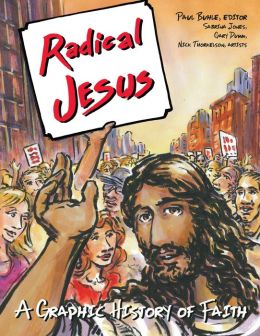 By Paul BuhleHerald Press By Paul BuhleHerald Press
|

Want to Know what CCDS has
been doing...Check it Out!
|
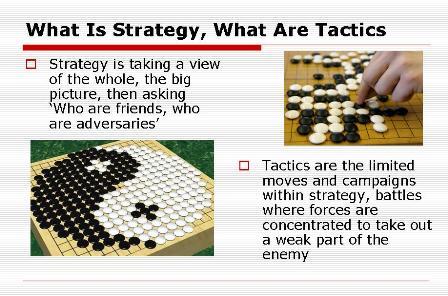 Keep On Keepin' On Keep On Keepin' OnHating the 'Middle Class,' Why Socialists Run in Elections, Strategy and Tactics Slide Slow, Class and Privilege, the Green New Deal ...and other Short Posts on Tumblr by Carl Davidson
|

Edited by Carl Davidson Revolutionary Youth and the New Working Class: The Praxis Papers, the Port Authority Statement, the RYM Documents and other Lost Writings of SDS Changemaker, 273pp, $22.50
For the full contents, click the link and view 'Preview' under the cover graphic.
|
 The new annual edition of our journal of discussion and analysis is now out. More than 170 pages, it includes 14 articles on strategy austerity, organizing, and the right. Cost is $10 plus shipping. Or get one by becoming a sustainer. Click the title to buy it directly. The new annual edition of our journal of discussion and analysis is now out. More than 170 pages, it includes 14 articles on strategy austerity, organizing, and the right. Cost is $10 plus shipping. Or get one by becoming a sustainer. Click the title to buy it directly.
|
|
By Randy Shannon, CCDS

"Everyone has the right to work, to free of employment, to just and favorable conditions of work and to protection against unemployment."
- United Nations Universal Declaration of Human Rights, December 10, 1948
I. Introduction
The "Great Recession" that began in 2007 has caused the greatest percent of job losses since the Great Depression of 1929. This crisis is the end of an era of unrestrained 'neo-liberal' capitalism that became public policy during the Reagan administration. The crisis marks a new level of instability with the growth of a global financial elite that targeted US workers and our trade unions after World War II.
|
|
Order Our
Full Employment Booklets
 |
...In a new and updated 2nd Edition
Capitalism may well collapse under its own excesses, but what would one propose to replace it? Margaret Thatcher's mantra was TINA...There Is No Alternative. David Schweickart's vision of "Economic Democracy" proposes a serious alternative. Even more fundamentally, it opens the door to thinking about alternatives. His may or may not turn out to be the definitive "successor system," but he is a leader in breaking out of the box. |
 by Paul KrehbielAutumn Leaf Press, $25.64
by Paul KrehbielAutumn Leaf Press, $25.64 | | Shades of Justice Video: Bringing Down a President, Ending a War |
|
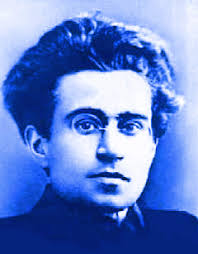 By Giuseppe Fiori
Verso, 30 pages
|

Essays on Mondragon, Marx, Gramsci
and the Green and Solidarity Economies |
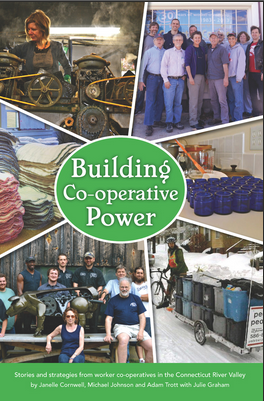
The Story of Workers Coops
in the Connecticut River
Valley Today.
Coauthors: Janelle Cornwell
(Worcester State University),
Michael Johnson (Grassroots
Economic Organizing Newsletter)
and Adam Trott (Valley Alliance
of Worker Co-operatives and
Collective Copies)
|

- Foreword by Susan Brownmiller
- Preface by Ken Wachsberger
$37.50 + $6 shipping
|
|
Discussion Documents for a Militant Movement

By Don Hamerquist
|
|
|
|
An Invitation to CCDSers and Friends...
 2014 Showdown: 2014 Showdown:
Top Billionaires
vs. Organized
Progressive Voters
We're the Committees of Correspondence for Democracy and Socialism...Do you have friends who should see this? Pass it on...Do you have a blog of your own? Others you love to read every day? Well, this is a place where you can share access to them with the rest of your comrades. Just pick your greatest hits for the week and send them to us at carld717@gmail.com! Most of all, it's urgent that you support low-wage workers, oppose militarized police, the war on Gaza, defend voter rights, plan for 2014 races now, oppose austerity, support the 'Moral Mondays' in North Carolina, the fight for the Green New Deal, a just immigration policy and the Congressional Progressive Caucus' 'Back to Work Budget'! We're doing more than ever, and have big plans. So pay your dues, make a donation and become a sustainer. Do it Now! Check the link at the bottom... |
Voters Turned Away Due to Texas Photo ID Law

"No one knows how many other voters are being turned away because of the draconian new law. For example, one election official reported that in one day of early voting at a single site, seven voters were turned away because they had expired or insufficient ID." (Photo: athrasher)
By Staff
Brennan Center for Justice
Oct. 30, 2014 - Voting is now underway in Texas, a state with one of the strictest voter ID laws in the nation. This is the first federal election since the US Supreme Court gutted a key provision of the Voting Rights Act, which would have required Texas to get government approval for these changes. Below are stories from actual voters and the difficulties they've encountered. Initials are used for those voters who wish to remain anonymous. In many cases, Texas failed these voters twice - first by requiring identification they did not have, and second by not training election officials to help them navigate the rules.
A Costly, Time-Consuming Barrier
Jesus Garcia was born in Texas and lives in Mercedes. He was unable to vote with his driver's license, which expired about a year ago. He went to the Weslaco Department of Public Safety (DPS) office twice and both times was unable to get an ID. His birth certificate was stolen and he does not have a copy. He wants to get identification, but to get both a replacement birth certificate and a new ID would be more than $30 combined. He is working a lot of hours, but money is tight. With rent, water, electricity, and everything else, Mr. Garcia is not sure he will be able to afford those documents, much less before the election.
Even if he does have the money, he will need to go through the whole process of getting the documents and going to the office again, when he has already tried to vote once and gone to a DPS office twice. Mr. Garcia thinks it is unfair that he cannot vote with the documents he has. He was born here and he has an ID with his picture on it; it's just expired. He has a voter registration card, and voted in past elections.
Deputized to Register But Denied the Ballot
Krystal Watson is a student at Wiley College in Texas, a historically black college. She is originally from Louisiana and has voted in past elections in Texas. This year, she signed up as a deputy registrar and registered about 100 people to vote. The person who deputized her told her the registration rules but not about the new voter ID requirement. When she herself went to vote, she was not allowed to cast a ballot because she had a Louisiana driver's license and a Wiley College ID, but not the ID required by the law.
Ms. Watson stated that she has observed many other students having trouble voting. She didn't know whether she would be have the time or resources to get an identification card, which would require her to bring in her birth certificate.
'You can't vote with this card'
Mr. R is an American in his 30s who lives in the small southern Texas town of Edcouch. He and his wife were both turned away from the polls last week because they do not have satisfactory identification under the new ID law. Mr. R had a driver's license that was valid until 2015, but it was taken away from him in connection with a DUI. Mr. R tried to use a driver's license that expired in 2009 - which he had used successfully to vote at the same polling location the last time he voted - as identification. This time, when he went to the polls during early voting, he was told, "You can't vote with this card."
The poll workers Mr. R encountered were unfamiliar with the basics under the new strict photo ID law. Mr. R. was not told anything about how to get an Election Identification Certificate (EIC), the allegedly free ID available to people who want to vote, but don't have a qualifying ID. Nor was he offered a provisional ballot, which would have given him additional time to obtain ID. Mr. R said he was unlikely to go and get an EIC once he learned that he'd have to procure it from the DPS, a law enforcement agency, because he owes traffic fines he can't afford.
Disabled Voters Can Participate - But Only If Family Members Foot the Bill...
Esmeralda Torres is a disabled American who lives in Elsa. She first learned about the new ID law when she tried to vote. She was blocked because she didn't have acceptable ID. Her disabilities preclude her from driving and make it hard for her to get around. Ms. Torres had previously tried to get an ID but had been rejected because she lived with her sister and had few documents containing both her name and her physical address. ...(Click title for more)
|
|

By Steven Rosenfeld
Alternet
Oct, 29, 2014 - On Tuesday, a Georgia court refused to issue an emergency order adding more than 56,000 people to this fall's voter rolls.
Civil rights groups sued Georgia's Secretary of State, Brian Kemp, a Republican, claiming that he and county election offiials were not processing voter registration forms submitted by the New Georgia Project, which turned in more than 81,000 applications gathered in communities of color. The election officials claim they don't have the missing applications.
Fulton County Superior Court Judge Christopher S. Brasher threw out the lawsuit, writing that the New Georgia Project "failed to allege, much less show, the counties' registrars past or continued failure to process voter registration applications."
The ruling might have a big impact on Georgia's already close U.S. Senate race [4] and governor's race [5]. Across the country, as early voting starts this week in a handful of states where rightwing governors face tight races and the Senate's majority is up for grabs, decisions by federal and state courts have been shaping voting with partisan implications.
Most of the litigation is not about voter registration, but about new state-issued photo ID requirements to get a ballot. The Republican Party, nationally, has been behind most new laws that have made voting more cumbersome-and in some cases, impossible. But the GOP has not always been winning in court, despite what just happened in Georgia. In some states, Republican efforts to police the polls appear to be backfiring,
That's the case in Wisconsin, where Republican Gov. Scott Walker is in a tight re-election fight and his new voter ID law was blocked by courts for this fall after a high-profile legal fight. In Pennsylvania, where another rightwing governor, Tom Corbett, is far behind in the polls, his voter ID law was also blocked [6] by a judge this year. In Arkansas, the state Supreme Court also threw out [7] a tougher voter ID requirement, which might boost turnout in a state with a close U.S. Senate race. Higher voter turnout is seen as possibly helping Democratic candidates, and negative press about the laws can motivate people to vote to be heard.
But Republican partisans also have been winning election laws cases in court. Before Tuesday's Georgia ruling, the most high-profile example was Texas, where the U.S. Supreme Court's rightwing majority upheld its new and more restrictive voter ID law.
In her dissent [8] in that ruling, Justice Ruth Bader Ginsburg noted that a lower federal court had found that upwards of 600,000 Texans lacked IDs, and that the state was doing little to inform voters about the new law's requirements. The new ID law's biggest beneficiary is likely to be one of its top defenders, Texas Republican Attorney General Greg Abbott, who is running for governor against Democratic state Sen. Wendy Davis.
The U.S. Supreme Court also upheld [9] most of North Carolina's tough-minded voting reforms, which are seen as helping Republicans in another state with a pivotal Senate contest. The Court agreed with ending Election Day registration, a policy that encourages turnout, and it also upheld a technicality where a provisional ballot turned in at the wrong precinct would not be counted. In a polling place, that "wrong precinct" could be another table in a high school gym. North Carolina's tougher voter ID law will not be in place this fall, but Republicans have complicated the process, which can discourage voting.
A slightly different voter registration fights has been unfolding in Kansas, where Republican Secretary of State Kris Kobach instituted a proof of citizenship requirement for state elections. More than 10,000 [10] otherwise eligible Kansans-who were registered but didn't have a copy of a birth certificate or passport to prove their citizenship-are in a "suspense" file. That means their registration is incomplete and votes won't count even if they cast a provisional ballot. Kansas has several tight top races where rightwingers could be ousted.
Calling Out Voter Suppression
The 2014 election is not just seeing judges issuing voting rights rulings with partisan implications. A handful of federal judges who do not like the GOP's war on eligible voters-including at least one well-known conservative-have said so in their rulings....(Click title for more)
|
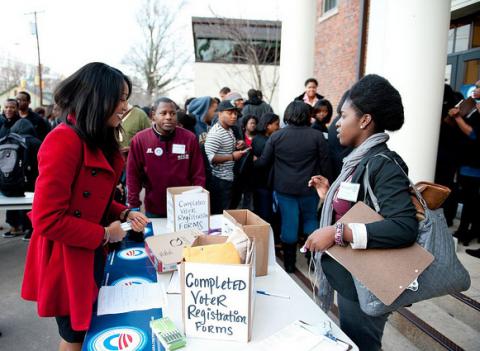
By Evan Walker-Wells
Facing South
Oct 28, 2014 - These efforts to curb young and minority voters come as youth -- and especially minority youth -- are becoming increasingly larger parts of the American electorate.
Voters between 18 and 29 years old were critical to President Barack Obama's victories in 2008 and 2012. In North Carolina in 2008, the only age group of which a majority voted for Obama was voters aged 18 to 29, according to CNN. Obama won the state by just 14,177 votes.
First they were supposed to vote early -- in a nightclub. Then students, employees, and faculty at North Carolina's Appalachian State University were supposed to vote early a mile from the farthest edge of campus, in a county building that had little parking. Then, after students filed a lawsuit, a state judge intervened, saying that the county board of election's decision to end early voting in the on-campus student union -- after eight years of allowing it -- could have no purpose but to disenfranchise students and was unconstitutional. That decision, however, was not the final word. It was put on hold by an appeals court, and then the North Carolina Supreme Court agreed to hear the case.
By that time, the Watauga County Board of Elections had decided to restore on-campus early voting -- a practice it had eliminated by a partisan vote pushed by the board's Republican majority. Appalachian State is the largest employer in Watauga County, and its students make up roughly 40 percent of the county's population, but their preference for Democratic candidates does not jibe with the rest of the county's Republican tilt. In 2012, about 35 percent of the county's early votes were cast at the Appalachian State student union.
But after all the chaos, it turns out that Appalachian State students are the lucky ones: They are some of the only students in North Carolina who will be able to vote early on campus this year. Early voting sites have been eliminated on college campuses across North Carolina and the South, part of a broader effort by local elections officials and state lawmakers to erect new barriers to voting. The new policies, which run the gamut from shortened early voting periods to strict voter ID requirements, disproportionately affect young voters -- and especially youth of color.
"If you look at what young voters did in this state [North Carolina] in 2008 and 2012, it's impossible to not conclude they mattered a lot," said Allison Riggs of the Southern Coalition for Social Justice, one of the law groups representing plaintiffs in a challenge to a restrictive election law the North Carolina legislature passed last year. "When young voters turn out a lot it can be dangerous to entrenched power, so they're seen as threatening."
After Republican takeovers in statehouses across the country and the South in 2010, many states enacted new restrictions on voters. And the U.S. Supreme Court ruling in Shelby County v. Holder last year striking a key provision of the Voting Rights Act freed many states with histories of discriminatory voting practices to pass and enforce new laws without approval by the federal government. Four Southern states -- Texas, North Carolina, Mississippi, and Alabama -- used the new lack of federal oversight to enact restrictive voting laws that disproportionately affect young and minority voters. A group of young voters are challenging North Carolina's law on the basis that it abridges their right to vote in violation of the Constitutional guarantee that all 18 year-olds can vote -- the first time voters have challenged a voting law on age discrimination grounds.
Virginia is implementing its voter ID law for the first time this fall -- as are Alabama, Mississippi, and Texas. Voter ID requirements can also disproportionately affect young voters since the laws in some states like Texas do not allow the use of student IDs, even if issued by public universities. (North Carolina will begin enforcing a voter ID requirement that excludes student IDs in 2016.) As a consequence of such laws, and due to a higher likelihood of not having other eligible ID, young voters are more likely than the general population to report not showing up to vote.
And in Florida, notorious for long lines and other problems in past elections, voting rights advocates say state law may hurt young voters this year as well. In 2011, the state government cut early voting by six days, contributing to very long lines in the 2012 election. A study by the Advancement Project found that long lines affected young voters and voters of color more than older and white voters across Florida.
Ciara Taylor, political director at the Dream Defenders, a group advocating for voter activism against police brutality and racism, reports that polling places have been moved off college campuses across Florida. In Tallahassee, for example, there are no early voting places on either Florida State's or Florida A&M's campuses, which have a combined enrollment of over 50,000 students. And while Florida allows voters to use student IDs to vote, they must also present an ID that has their signature, such as a credit card.
"The voter ID law goes hand in hand with the cut back of polling locations at college campuses and shorter hours at polling places," Taylor said.
Targeting young voters in North Carolina
In North Carolina, county boards of elections have closed on-campus early voting sites across the state, making it harder for students to vote. Students at historically black Winston-Salem State University will not have on-campus early voting polling locations. North Carolina State University, Duke University, East Carolina University, and the University of North Carolina at Charlotte have lost their on-campus sites for early voting and the general election as well. ...(Click title for more)
|
By Peter Dreier
Truthout | News Analysis
Oct 29, 2014 - The first Battle of Richmond took place in 1862, when the Confederate army won a stunning victory over Union troops in that Kentucky town. In terms of casualties, 206 Union soldiers were killed, 844 were wounded and 4,303 were captured or missing. The Confederate side suffered far fewer losses - 78 killed, 372 wounded, and only one soldier missing.
The current Battle of Richmond pits Big Oil and Wall Street against the citizens of the working class city of Richmond, California, north of San Francisco. The weapons aren't rifles and cannons, but corporate cash against the votes of ordinary citizens. What's at stake is the future of our democracy.
In the wake of the Supreme Court's Citizens United and McCutcheon rulings, big business is reaching deep into its pockets to stop this challenge to its power and privilege.
Across America, cities have become ground-zero in the battle against plutocracy. In cities like New York City, Seattle, Minneapolis, Pittsburgh, Boston, San Antonio, Phoenix, Newark, Los Angeles and Jackson, Mississippi, voters have recently elected progressive mayors and city council members who campaigned to challenge Wall Street and corporate America.
Once in office, these progressive and populist politicians work with community groups, environmental activists and unions to address the widening gap between the superrich and everyone else, adopt citywide living wage laws to help lift families out of poverty, fight for families facing foreclosures and layoffs, reign in the corporate polluters who put profits over people and public health, end racial profiling by local police and deal with racial inequality and discrimination by landlords and employers.
Of course, the plutocrats aren't sitting on their hands while the people fight for a fair economy. In the wake of the Supreme Court's Citizens United and McCutcheon rulings, big business is reaching deep into its pockets to stop this challenge to its power and privilege. They are spending billions in campaign contributions, lobbying and election slush funds to try to buy and rent politicians. And, make no doubt about it, many candidates have a "for sale" sign on their campaign headquarters, more than happy to take Wall Street and Big Oil's money.
Nowhere is this battle between organized people and organized money more evident than in Richmond, a small city of 106,000. There, Mayor Gayle McLaughlin, together with a team of progressive elected officials and their feisty allies among community groups, environment activists and labor unions, have turned their town into a laboratory for democracy around major national issues like Wall Street accountability and climate justice.
Over the past decade, Wall Street banks victimized Richmond's working class families with high-risk predatory mortgages. As a result, Richmond has had more than its share of foreclosures, particularly among black and Latino residents, who represent 26 percent and 40 percent of the city's population, respectively.
2014 1029 chev 3Mayor McLaughlin in front of Wells Fargo Headquarters in San Francisco. (Photo courtesy of ACCE)Close to half of all homeowners there are "underwater" - they are drowning in debt. In response, Mayor McLaughlin and the City Council struck fear into Wall Street by becoming the first city in the country to pass a plan (still to be implemented) to use eminent domain - a tool typically used to hurt our communities - in a new way to fix troubled mortgages and keep people in their homes.
But the real David versus Goliath story concerns Richmond and Big Oil. ...(Click title for more)
|
'We Are Tired! Vote for What Is Right!
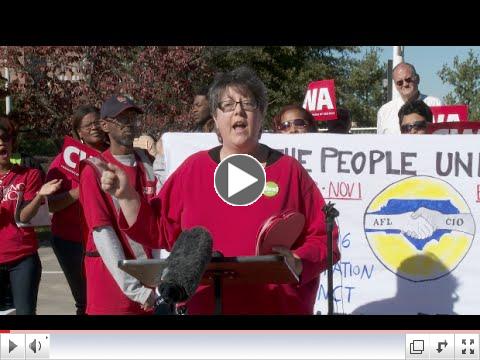 | |
North Carolina Teacher: "We are tired!
|
|
Methane Clouds: Yet Another Reason
to Transition to Green Renewables

NASA Confirms A 2,500-Square-Mile Cloud Of Methane Floating Over US Southwest By Mike G
SolidarityEconomy.net via desmogblog,com
When NASA researchers first saw data indicating a massive cloud of methane floating over the American Southwest, they found it so incredible that they dismissed it as an instrument error.
 But as they continued analyzing data from the European Space Agency's Scanning Imaging Absorption Spectrometer for Atmospheric Chartography instrument from 2002 to 2012, the "atmospheric hot spot" kept appearing. The team at NASA was finally able to take a closer look, and have now concluded that there is in fact a 2,500-square-mile cloud of methane-roughly the size of Delaware-floating over the Four Corners region, where the borders of Arizona, Colorado, New Mexico, and Utah all intersect.
A report published by the NASA researchers in the journal Geophysical Research Letters concludes that "the source is likely from established gas, coal, and coalbed methane mining and processing." Indeed, the hot spot happens to be above New Mexico's San Juan Basin, the most productive coalbed methane basin in North America.
Methane is 20-times more potent as a greenhouse gas than CO2, and has been the focus of an increasing amount of attention, especially in regards to methane leaks from fracking for oil and natural gas. Pockets of natural gas, which is 95-98% methane, are often found along with oil and simply burned off in a very visible process called "flaring." But scientists are starting to realize that far more methane is being released by the fracking boom than previously thought.
Earlier this year, Cornell environmental engineering professor Anthony Ingraffea released the results of a study of 41,000 oil and gas wells that were drilled in Pennsylvania between 2000 and 2012, and found newer wells using fracking and horizontal drilling methods were far more likely to be responsible for fugitive emissions of methane.
According to the NASA researchers, the region of the American Southwest over which the 2,500-square-mile methane cloud is floating emitted 590,000 metric tons of methane every year between 2002 and 2012-almost 3.5 times the widely used estimates in the European Union's Emissions Database for Global Atmospheric Research-and none of it was from fracking. ...(Click title for more)
|
|
Outrage over 'Disappeared' Students
By Homero Aridjis
Huffington Post
MEXICO CITY -- Mexico has been profoundly shaken by atrocities and high-level corruption in Guerrero. The earthquake's epicenter is Iguala, the state's third largest city.
Fifty thousand marchers thronged Mexico City's main avenues last Wednesday, and demonstrations took place all over the country. More than 80 delegates to the Inter-University Assembly have called for a nationwide halt to all educational activities on Nov. 5, and are asking other social groups to join them. Protesters set fire to state headquarters in Chilpancingo, Guerrero's capital, and are sacking supermarkets and shopping centers.
Here are the events that sparked the earthquake:
On Sept. 26, María de los Ángeles Pineda Villa, wife of Iguala's Mayor José Luis Abarca, of the left-leaning Party of the Democratic Revolution, was in the main square giving a speech about her accomplishments as head of the municipal social services agency, and it was rumored that she would announce her candidacy to succeed her husband as mayor in next June's election, since she is also a state PRD official.
Just as she was beginning, two busloads of students from the notoriously radical rural teachers' college in nearby Ayotzinapa, who had come to town to raise money to supplement their meager 50 peso daily allowance, headed for Iguala's central square. According to the Federal Attorney General's Office, the mayor ordered the local police chief to stop them. After a minor clash with police the students "borrowed" three buses from the local bus station to return to Ayotzinapa and later travel to this year's march in Mexico City commemorating the October 2, 1968 massacre in Tlatelolco, and were driving out of town when they were sprayed with machine gun fire by police and gunmen from the Guerrero Unidos (United Warriors) cartel.
Three students died, as well as a soccer player in a bus bringing a third division team to town that was also fired on, a taxi driver and his female passenger. One student who panicked and ran off when his classmates were rounded up by police and gang members was later found dead, his eyes gouged out and face flensed with a box cutter, in an act of gratuitous violence. Forty-three students were bundled into police cars and have disappeared.
Pineda's family had been working with the Beltrán Leyva, Sinaloa and Guerreros Unidos cartels for years, two of her brothers were gunned down in gang violence, another served time in jail, and a recently captured leader of Guerreros Unidos identified her as "the key operator" of criminal activity in and around Iguala. The Abarcas have not been seen since the mayor hastily requested a leave of absence, and perhaps they are already in one of the burial pits.
Official statements that the 38 bodies found so far in 10 makeshift mass graves are not the students have exacerbated rather than calmed public anger, as now the other question is, who are these trussed up, tortured, headless or charred corpses? Will there be an investigation to find the perpetrators? Or will time be allowed to pass until public indignation subsides, and these cases will join the roughly 98 percent of unsolved homicides in the country that have been swept under a rug as high as the Pico de Orizaba, Mexico's tallest mountain? On Oct. 27, information given by four people arrested early in the day led to the discovery of another clandestine grave holding human remains in the municipal garbage dump in Cocula, whose mayor and police force were arrested two weeks ago.
A month after the Iguala atrocities, officials are bogged down in a quagmire of contradictory information and paralysis in the punishment of those responsible for the disappearance of the 43 students. ...(Click title for more)
|

Chuy Garcia with Congressman Jan Schakowsky at lobr rally
By Yana Kunichoff
In These Times
Oct 28, 2014 = Chicago's progressives may still be reeling from Karen Lewis's withdrawal from the city's mayoral race, but a new progressive candidate may help ease their pain-and perhaps push Mayor Rahm Emanuel into a run-off.
Jesus "Chuy" Garcia told the Chicago Sun-Times on Monday that he plans to run for mayor. Garcia, who is currently Cook County Commissioner of the 7th district, has been in local government for the past 28 years. For most of that time, he's positioned himself as a progressive-first while alderman as a key supporter of Harold Washington, the city's first black mayor; then as the first Mexican-American elected to the Illinois State Senate.
Garcia has also paid a price for his progressive politics: After winning his State Senate seat, Garcia was later unseated by a candidate buoyed by the Hispanic Democratic Organization, the Latino arm of then-Mayor Daley's patronage machine that later folded after multiple scandals.
Local media has pegged Garcia as running a campaign to the left of Rahm Emanuel that will pick up disappointed voters who would have otherwise have thrown their support behind Lewis or Toni Preckwinkle. Preckwinkle, the popular Cook County Board President, has been critical of Emanuel's policies on education and criminal justice but declined to step into the mayoral race.
In his first public comment as a candidate, Garcia touched on Emanuel's reputation as a friend of the one percent and called out the unpopular school closings.
"The trickle-down economics [Emanuel] espouses is tilted in favor of the well-to-do and the center city," Garcia told the Sun-Times.
On the closure of 49 schools, one of Emanuel's most enduring legacies, Garcia said: "The school closures made Chicago a leader, I think, in the wrong way. It was a terrible blunder that snuffed the life out of many communities."
Dick Simpson, a professor in the University of Illinois at Chicago department of political science and a former alderman, says the big question is whether Garcia will be able to raise the resources to challenge Rahm.
"To run for mayor, you need to be able to raise about $3 to $5 million and mobilize thousands of volunteers," Simpson says. "He'll get more name recognition if he has the resources to promote his candidacy with television ads and mail."
According to the Chicago Tribune, Garcia's campaign only had a little over $3,000 in cash at the end of last month. Emanuel, by contrast, had already raised $5 million in campaign funds more than a year before the election from a smattering of Hollywood donors, financial industry contacts and big businesses, and currently has more than $8 million in his campaign fund, according to the Tribune.
A key factor in Garcia's candidacy-and in securing the funds to run-could be the support of organizer labor....(Click title for more)
|
 By Michael Hirsch By Michael Hirsch
The Indypendent
Oct 29, 2014 - In 1955, when the country's two contending labor federations merged to form the AFL-CIO, the combined organization represented more than one in three American workers. Unions then were strong enough, employers cautious enough and the economy juiced enough to create a working class that for the first time in history was for the most part not poor.
Today the number of union members in the civilian labor force alone is just a hair above one in nine. The numbers are worse for private sector workers, where just one in 14 are unionized - this in a period when pay is frozen, real wages fall and an explosion of young people work at part-time or contingent jobs, when they work at all.
The reasons for the collapse of the "House of Labor" are many: the failure of the postwar drive to organize the South, the purges at the onset of the Cold War of radicals who were often labor's best organizers, insular union leaders who emphasized contract unionism, allowing employers free rein to run their own enterprises with no voice from workers. Union leaders even traded away the right to strike for more or less steady work. Then there's the sheer power of U.S. capital, at home and unchained.
Even in their debilitated state, unions remain by far the largest and most deep-pocketed institutions on the left and, in theory, have the potential to be the anchors of a broad-based, multiracial progressive movement. Yet, organizing the unemployed and making alliances with community groups and radicals are sadly rare. Even the support Occupy received from labor - which in New York City was a lot - was episodic. And the outstanding things Occupy did, including intervening in home foreclosures, are not yet on any union's agenda.
None of this is new to people who follow labor closely. What's new is the way it is understood by Stanley Aronowitz, former factory worker, union organizer with the Amalgamated Clothing Workers and the Oil, Chemical and Atomic Workers unions, prolific author and sociology professor at the CUNY Graduate Center. His latest book, The Death and Life of American Labor: Toward a New Workers' Movement is a slim, compelling and highly readable treatment. It builds on work Aronowitz has done over the past four decades since the publication of his seminal work, False Promises: The Shaping of American Working Class Consciousness. This latest not only harks back to the labor movement's glory days in the 1930s and charts the present hard times for working people, but also looks at a problematic future where he says mass unemployment will be the rule and union resistance extinct unless labor rediscovers its historic mission of fighting not just for its own static or shrinking memberships but for engaging every worker and every worker's family in the fight.
Aronowitz targets collective bargaining itself as the rock in the shoe. Contracts have their good points: they lock in wages and benefits, codify work rules and prescribe a transparent and agreed-upon due-process system for handling grievances, discipline and firings. In return, workers give up their birthright: the right to strike and challenge the employer's arbitrary right to manage.
In the postwar boom years such a strategy bought labor peace. With the flight of manufacturing jobs, first to the South, then to Mexico and overseas in search of a workforce that would work for almost nothing, good jobs at home shriveled and unions workers were forced to make major concessions on wages, benefits, working conditions and even job security. Collective bargaining today, Aronowitz says, "is now mostly a kind of collective begging."
For the author, the era of labor-management cooperation initiated by the New Deal and welcomed by unions has come to an end. At this point business isn't even looking for lapdogs, let alone labor allies. It's a brave new world where business-driven automation across many sectors of the economy is gaining speed and destroying more U.S. jobs at home than are outsourced overseas. Worst of all, the unions' dependency on management circumscribes revolt. Labor-led struggles, such as they are, are either defensive efforts in support of Social Security and Medicare or parochial battles to preserve defined benefit pensions for government workers while private sector employees must rely on 401K plans that are contingent on a booming investment market that regularly goes through bust cycles.
Aronowitz's advice: encourage direct action in the workplace (such as the walkouts that galvanized the fast-food workers movement), don't leave the fightback at protracted grievance handling and fight for a guaranteed basic income - even a $15 minimum wage is below the poverty level....(Click title for more)
|
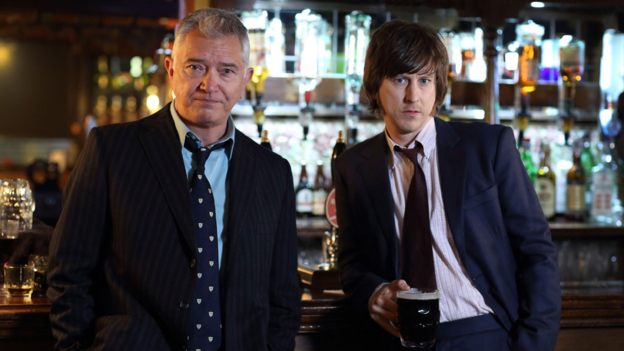
From the BBC
It's 1969 and Gently and Bacchus are both suffering from their own physical and mental scars several months after the horrific shootings that nearly claimed their lives in Durham Cathedral.
The classic series Inspector George Gently returns for its seventh series, with four new feature-length episodes filmed on location in Northumberland for BBC One.
INSPECTOR GEORGE GENTLY has become an audience winner and is renowned as a series that lovingly recreates the Sixties in perfect, nostalgic detail - and Martin Shaw and Lee Ingleby make the perfect police partnership, full of warmth, humor and attack. In this new series they discover they have different approaches to a world that is changing very fast.
As the series opens, Gently has been pushing himself to full fitness and is back at work, while Bacchus is still recuperating from his serious injuries in a police convalescent home...
Film One
Gently Between The Lines by Tim Prager, sees Gently shocked to receive Bacchus's resignation, but he soon realises that his sergeant has lost his confidence. Setting about to fix Bacchus, Gently insists that whilst he serves out his notice, he needs him to help investigate a death in custody.
The Newcastle police have arrested rioters as they tried to clear a slum due for demolition. The next morning one of the protesters is discovered dead in the cells by WPC Rachel Coles (LISA MCGRILLIS - Hebburn, The Pitman Painters). This will turn into a case that will have both Gently and Bacchus questioning what it means to be a police officer at a time when attitudes to the police are changing.
They are no longer the trusted, familiar, local "bobbies on the beat". Police officers are now being seen as agents of the state. Cast includes: ROBERT PUGH (The Shadow Line, Game of Thrones), STEVE EVETS (Rev, Five Days), RUTH GEMMELL (Inside Man, Utopia), MATT STOKOE (The Village, Misfits) and CAROLINE O'NEILL (Doctors, Holby City).
Film Two
Blue For Bluebird by Jess Williams, takes Gently and Bacchus to the Blue Bird Holiday Camp, to investigate staff and holidaymakers, when the body of one of the entertainers is washed up nearby.
The colourful inmates of the holiday camp, from the flamboyant owner and his sister, to the chalet girls, performers, lifeguards and guests, throw the investigation sideways as Gently and Bacchus uncover a story of jealousy, ambition and the dark underbelly of the permissive society. PC Rachel Coles (LISA MCGRILLIS) is now part of the support system for Gently and Bacchus at the police station with her modern policing ways....
Cast includes: PIXIE LOTT in her television drama debut, LEE BOARDMAN (Coronation Street, Great Night Out), NEIL MCDERMOTT (Eastenders, Doctor Who), ANDREA LOWE (DCI Banks, Coronation Street), EMMA FIELDING (The Cranford Chronicles, Waking the Dead), JODIE COMER (My Mad Fat Diary, Casualty) and LISA RILEY (Waterloo Road, Emmerdale). ...(Click title for more)
|
|
Keep up with the Moral Mondays with a Red Resolution...
Become a CCDS member today!
 The time is long past for 'Lone Rangers'. Being a socialist by your self is no fun and doesn't help much. Join CCDS today--$36 regular, $48 household and $18 youth. The time is long past for 'Lone Rangers'. Being a socialist by your self is no fun and doesn't help much. Join CCDS today--$36 regular, $48 household and $18 youth.
Better yet, beome a sustainer at $20 per month, and we'll send you a copy of Jack O'Dell's new book, 'Climbing Jacobs Ladder,' drawing on the lessons of the movement in the South in the 1950s and 1960s.
Solidarity, Carl Davidson, CCDS
|
|
|